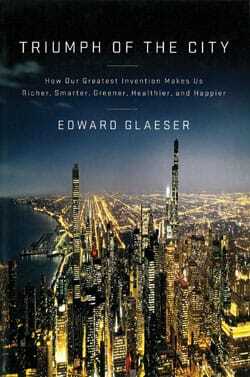Triumph of the City: How Our Greatest Invention Makes Us Richer, Smarter, Healthier, and Happier
Edward Glaeser
Penguin Group (USA)
375 Hudson Street, New York, NY 10114;
www.penguingroup.com.2011.
400 pages. $29.95, hardcover.
It is rare, if not altogether unheard of, for cities to be referred to as inventions born of humankind. Usually, the dialogue centers on organic growth or phased development or systematic redevelopment, all of which occur over decades if not centuries. But in Triumph of the City, author Edward Glaeser frames the discussion as cities being the products of human invention.
Glaeser is the Fred and Eleanor Glimp Professor of Economics at Harvard University. A senior fellow at the Manhattan Institute and director of the Taubman Center for State and Local Government and the Rappaport Institute for Greater Boston, Glaeser has always been a source of insightful and thought-provoking perspectives on cities.
Glaeser continues his pro-city march in Triumph of the City by deftly explaining, dissecting, and combining the economic, cultural, and physical components of the urban environment. He has the rare ability to expound both theoretically and practically, applying ideas to real-world settings and distilling the pros and cons of those ideas. He takes on anti-urban biases, misguided environmentalists and preservationists, and the issue of “right-sizing” cities, among many other urban-focused debates and dialogues.
In this book, Glaeser takes the reader on a global tour of cities and regions past, present, and future, including Athens, Bangalore, Silicon Valley, and New York City. Insights regarding the causes of urban decline and—believe it or not—what he cites as the positive aspects of poverty ground Glaeser’s argument, which then evolves to consideration of density and “smarter environmentalism,” as well as many other perspectives on cities.
The most striking chapter is “How Do Cities Succeed?” Glaeser discusses several city archetypes—the imperial city, the well-managed city, the smart city, the consumer city, and the growing city—using both domestic and international examples. These examples are considered in terms of corruption, human capital, and bad government, among other factors, as is their ability to remain “pleasant,” affordable, and, of course, dense.
According to Glaeser, cities account for about 3 percent of U.S. land. Despite that low share, nearly two-thirds of Americans live in cities. Such a concentration of people and intellectual energy is inarguably important to the country’s well-being. In the end, the success of cities boils down to their unmatched ability to provide opportunities for collaboration. Only a handful of people are able to elucidate the appreciation and support cities deserve. Edward Glaeser is at the top of that list, and Triumph of the City his most effective means for doing so.





